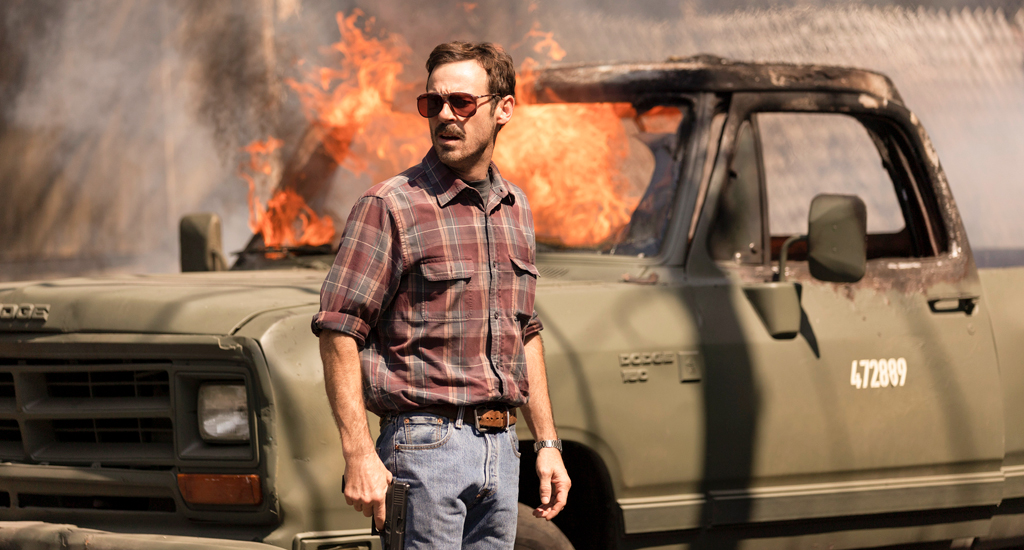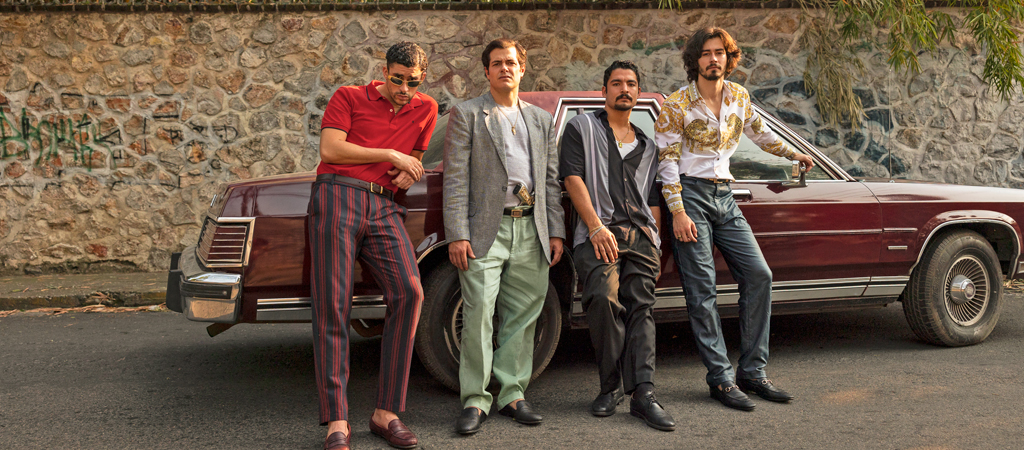
Narcos: Mexico (which consistently gets high on its own supply) shall soon end a six-season saga that’s revolved around warring kingpins, trucks full of drugs, loads of excess, and the best promo photos in the business. In the midst of it all, a motley crew of characters make themselves inexplicably likable, relative to the bad things they do. It’s such a fun show, despite all the terrible things that happen, and Narcos is one of those joints that fits many moods. It’s action-packed and meme-able, and it’s more intellectual than one could ever realistically have expected, all while giving us giggles along the way. It’s a soap opera full posturing from cartel heads and law enforcement alike. It’s always been more than a little bit macho but never afraid to laugh at itself.
Narcos has been profound as hell, too, and that happens in the most unexpected ways. Like when Pablo Escobar, monster that he was, became undeniably human while enjoying some damn ice cream in the park, and could practically see his soul and how happy and peaceful he felt. He was freed from the prison of his own making, all before he went down in a necessary hail of bullets. And that brings me to what I’ve enjoyed the most about this saga: characters of significance show both shades of darkness and glimmers of light. Yet no one could ever accuse Pablo Escobar of being a good guy. Not even close, despite the Robin Hood thing. His destructive legacy claimed countless lives, and his hippos are still running amok in real life. Yet the point was not to glamorize Escobar, but rather, to question the whole evil-vs-good dichotomy of the War on Drugs. There aren’t too many “good” guys in this show. There are also no winners here, and there’s no ending to it, either.
As I watched the final episodes of Narcos: Mexico, a certain line from Steve Murphy (Boyd Holbrook) echoed in my head. You know the one? “The Devil’s a real letdown” was what he said as Escobar took his final breaths in Season 2. Well how, exactly, does this show avoid being a letdown when the powers that be couldn’t “finish” a story that never actually ends IRL? I won’t spoil how it happens, but I can tell you five ways that Narcos: Mexico satisfies (and season’s tagline actually is “the final blow”) while doing so.

– Scoot McNairy’s heroic mustache frankly rules: I’ve beat this drum already, so I’m getting this point out of the way first. Scoot has made it clear to us that he can’t wait to shave his mustache whenever he finishes up filming, but god, Scoot, just give in to the power of that facial hair. That mustache leads more resonant conversations and does a lot more maneuvering this season than last time. This is a trustworthy mustache, which makes its existence all the more tragic because Walt Breslin isn’t the classic good guy. He’s achingly complex and plagued by personal demons. This season, Walt Breslin kind-of f*cks with his audience, both on the show, and narratively speaking. What happens brings beautifully flawed humanity to the game and wraps things up well. Regardless of whether Walt Breslin’s a hero, that mustache definitely qualifies as one.
– Narcos: Mexico knows that it very well couldn’t put a bow on the ending: The show takes great pains to warn viewers that it’s a dramatized version of actual events in the drug war. So, we can’t expect total accuracy in details, and some of the franchise’s most sensational scenes were embellished; as with Kiki Camarena (Michael Peña) never really holding a gun to his own head, and at least according to Félix Gallardo (Diego Luna), he never actually met with Escobar. Likewise, composite characters (like Walt Breslin) are amalgamated from real-life figures. Narratively, these were the right moves, to add texture to the whole heroes-vs-villain concept. Most major characters here wallow around in their chosen excesses, until they’re consumed, and the “heroes” are no exception. This season, the gleeful prediction from Gallardo comes true. In taking Guadalajara Cartel down, the fledgling DEA inadvertently unleashed a circus of up-and-coming kingpins. And the drug war is still going, but Narcos ends the storytelling with one of its signature touches: those rare, quiet conversations, which add structure to what could otherwise be absolute chaos.

– The show does not cut corners in the stylish villain department: This season ultimately sees the rise of El Chapo Guzmán, who’s positioning himself for the rise of the Sinaloa Cartel and only recently found himself behind bars in real life. His real-life antics are downplayed in this season for the flashier heads of newly independent cartels. There’s the Arellano Felix family in Tijuana and Amado Carillo Fuentes in Juarez. Law enforcement and government corruption, at all ranks, is part of the drill, and the show certainly doesn’t consider the scrutinization of U.S. leaders to be off the table (and rightfully so). There are so many political shenanigans going down behind the scenes, but there are wild theatrics at the forefront. Returning bad guys surface, and there’s a massive crop of new ones. These guys (including one played by one portrayed by Benito Antonio Martínez Ocasio, a.k.a. Bad Bunny) are so ridiculously stylish and enjoyable to watch because, as Gallardo previously promised, the pact to get along and “prosper” could never last. So many snakes are eating their tails this season.

– We’ve got something of a Ladies Night: The treatment of women in Narcos‘s a low-key but present issue. Kiki Camarena’s wife didn’t receive enough of a story to highlight her real-life activism after her husband’s death. The girlfriend of Gallardo, the cocaine-soaked Queen Isabella Bautista (a leader herself), did prove to be an exception to the cartel rule, which is that women evaporate into the background; or at least, they did not overtly protest their circumstances, which was largely the case with Escobar’s wife. A female journalist who influenced Escobar grew uncomfortably close to him in the process, and all of those women were more complex than one would hope to expect from a “manly” show. Yet this final season delivers different twists on lady tragedy (Femicide in Mexico) and lady power than we’ve seen from the franchise. On the latter note, we receive the first female narrator, a journalist named Andrea Nuñez (Luisa Rubino) who guides us through all of the intricate history that pulls this season together. Her work for a guerrilla newspaper (which takes on the cartels and linked government corruption) sees some of the only truly selfless bravery in all of six seasons.
(Late-breaking update: Viewers should be quite interested to see Narcos and Narcos: Mexico showrunner Eric Newman’s upcoming (unrelated) limited series starring Sofia Vergara as Columbian queenpin Griselda Blanco. Vergara will likely nail that role, and we’ll see a lot of her serial-killing, Miami coke-running action when that story arrives.)
– Finally, the spirit of Escobar haunts the whole joint: There’s no secret as far as timelines intersecting between Narcos: Mexico and Narcos. That’s to be expected from a reverse time-jump between the shows. The wonderful thing, though, is that Wagner Moura (who portrayed Escobar, through his sad clown phase and everything else) returns to direct. And let’s just say that he makes his presence known, and I won’t elaborate, so that you can enjoy everything without spoilers. Narcos: Mexico does have an ending, although it’s a loose one that works both narratively and historically. I expect that this show won’t easily be forgotten (more spinoffs, anyone?) because, like the real-life saga, though, this tale will never truly end, nor will Narcos ever be forgotten.
‘Narcos: Mexico’ Season 3 streams on November 5.
